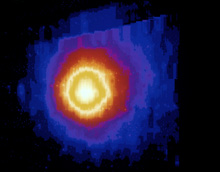Googleplex in Oregon - When the Moon? - "theGooglunaplex"
WON'T THE LUNAR SETTLEMENTS NEED TO BE CONNECTED TO THE INTERNET?
- LRK -
MAYBE GOOGLE WOULD LIKE TO MAKE IT SO.
- LRK -
MAYBE WE SHOULD SPRED THE RUMUR THAT GOOGLE, MICROSOFT, AND YAHOO ARE RACING TO THE MOON TO BE THE FIRST TO SET UP A SERVER FARM WHERE THEY CAN CONNECT WITH THE OFF WORLD COMMUNITIES. PLACE YOUR ADS ON THE LUNAR SERVER AND BE CLOSEST TO THE PULSE OF THE LUNAR COLONY.
- LRK -
Thanks for looking up with me.
Larry Kellogg
Web Site: http://lkellogg.vttoth.com/LarryRussellKellogg/
BlogSpot: http://kelloggserialreports.blogspot.com/
RSS link: http://kelloggserialreports.blogspot.com/atom.xml
Newsltr.: https://news.altair.com/mailman/listinfo/lunar-update
==============================================================
http://moon.google.com/
http://www.google.com/help/faq_moon.html
One small step for Google...
On July 20, 1969, man first landed on the Moon. A few decades later, we're pleased to cut you in on the action. Google Moon is an extension of Google Maps and Google Earth that, courtesy of NASA imagery (thanks, guys!), enables you to surf the Moon's surface and check out the exact spots that the Apollo astronauts made their landings.
Frequently Asked Questions
1. Why did you do this?
Because we couldn't think of a better way to commemorate the first lunar landing, which occurred on July 20, 1969, than to give our users an opportunity to surf around the lunar surface themselves.
2. Why can't I see the surface in more detail?
Google Moon only has as much data as NASA was able to give us, so there are limitations (for now) on how close to the surface we can zoom.
3. What happens if I try to zoom too close?
Well, you'll have to go and find out, won't you?
4. Is Google Moon a result of your Copernicus initiative?
Glad you asked, and yes, the development of our lunar hosting and research center continues apace. http://www.google.com/jobs/lunar_job.html We usually don't announce future products in advance, but in this case, yes, we can confirm that on July 20th, 2069, in honor of the 100th anniversary of mankind's first manned lunar landing, Google will fully integrate Google Local search capabilities into Google Moon, which will allow our users to quickly find lunar business addresses, numbers and hours of operation, among other valuable forms of Moon-oriented local information.
I have questions and/or comments about Google Moon.
Well, we want to hear them. google_moon@google.com
===================================================================
http://www.google.com/jobs/lunar_job.html
Google Copernicus Center is hiring
Google is interviewing candidates for engineering positions at our lunar hosting and research center, opening late in the spring of 2007. This unique opportunity is available only to highly-qualified individuals who are willing to relocate for an extended period of time, are in top physical condition and are capable of surviving with limited access to such modern conveniences as soy low-fat lattes, The Sopranos and a steady supply of oxygen.
The Google Copernicus Hosting Environment and Experiment in Search Engineering (G.C.H.E.E.S.E.) is a fully integrated research, development and technology facility at which Google will be conducting experiments in entropized information filtering, high-density high-delivery hosting (HiDeHiDeHo) and de-oxygenated cubicle dwelling. This center will provide a unique platform from which Google will leapfrog current terrestrial-based technologies and bring information access to new heights of utility.
A brave new frontier in search science. [See image at web site. -LRK-]
-------------------------------------------------------------------
http://www.google.com/jobs/lunar_job2.html
Why a lunar location?
It's a logical question to ask. Google's current engineering facilities in the United States, India and Switzerland are all leaders in search technology development. However, by locating a research and technology center on the Moon, Google engineers will be able to experiment with an entirely different set of parameters. For example, imagine tapping unlimited solar energy to drive megawatt data centers and power innumerable arrays of massively parallel lava lamps, with ample no-cost cooling available to regulate the temperature of server farms sprawling over acres of land unblighted by sentient lifeforms or restrictive zoning ordinances.
Moreover, Google's Copernicus Center will provide a clear ear on the chatter of the universe, the vast web of electromagnetic pulses that may contain signals from intelligent life forms in other galaxies, as well as a complete record of every radio or television signal broadcast from our own planet. Google's goal is to extract information from that cacophonous web and make it available to anyone with a mouse and a modem. Imagine discovering not only alien attempts at communication with Earth, but also such heretofore unavailable cultural treasures as Pink Floyd's 1968 appearance on the BBC and the tragically lost first season of "Iron Chef."
With the establishment of the Copernicus Center, Google's mission has grown beyond "organizing the world's information and making it universally accessible and useful." Our new goal is to "organize all the useful information in the universe and serve it to you on a lightly salted cracker."
http://www.google.com/jobs/lunar_job3.html
What are the challenges?
The first non-trivial challenge is building a lunar base. Google began drawing up plans for the construction of a lunar facility in the Copernicus Crater early in 1998, when the company's founders Larry Page and Sergey Brin were still graduate students at Stanford University. Applying a Patel extrapolation to Rosing linear projections, Page and Brin predicted that every man, woman and child on earth would be conducting at least seven searches a day by the year 2018. While their projections correctly predicted random spikes in search traffic due to wardrobe malfunctions, they failed to adequately factor in the hyperbolic trajectory of Britney Spears, which accelerated the rate of global search growth by a factor of seven.
Google's initial base, a spherical structure containing living quarters and a small data center, will take two and a half years to construct. This first G.C.H.E.E.S.E ball has been christened "the Googlunaplex" and will be populated by a dedicated cadre of software engineers, hardware operations technicians, cable installers, quantum mechanics and space planners. Google is firmly committed to using only earth-originated staffers and no jobs will be outsourced to lunar residents or those from other planetary systems unless the skill sets they offer cannot be easily replicated by native born terrestrials.
[See image at web site -LRK-]
The Googlunaplex will house 35 engineers, 27,000 low cost web servers, 2 massage therapists and a sushi chef formerly employed by the pop group Hanson.
-------------------------------------------------------------------
http://www.google.com/jobs/lunar_job4.html
Searching the heavens
-------------------------------------------------------------------
http://www.google.com/jobs/lunar_job5.html
New rules. New tools
-------------------------------------------------------------------
http://www.google.com/jobs/lunar_job6.html
Life in the Googlunaplex
-------------------------------------------------------------------
http://www.google.com/jobs/lunar_apply.html
Thrust yourself to the forefront of search
If you're intrigued by the opportunity to launch a new career, now is the time to step forward. For more information about the Google Copernicus Hosting Environment and Experiment in Search Engineering, please contact us today at lunarjobs@google.com.
Applicants must be at least 18 years of age by April 1, 2007 and have proof of earth residency. Google is an equal opportunity employer.
===================================================================
http://dailywireless.org/modules.php?name=News&file=article&sid=5530
Googleplex in Oregon
Posted on Wednesday, 2006 June 14 @ 01:43:07 PDT
Topic: General News
John Markoff and Saul Hansell of The New York Times have the story on Google's secret project in Oregon.
http://www.iht.com/articles/2006/06/13/business/search.php
[See image at web site. -LRK-]
http://www.nytimes.com/2006/06/14/technology/14search.html
?ex=1307937600&en=c96a72bbc5f90a47&ei=5088&partner=rssnyt&emc=rss
The Dalles, Oregon on the banks of the windswept Columbia River, is home to Google's secret weapon to dominate the next generation of Internet computing
-- The Googleplex.
But it is hard to keep a secret when it is as big as two football fields, with twin cooling towers protruding four stories into the sky.
[See image at web site. -LRK-]
http://www.ci.the-dalles.or.us/
The towers, looming like an information-age nuclear plant, mark the site of what may soon be one of the world's most powerful supercomputers, helping to supply the ever-greater horsepower needed to process billions of search queries a day and a growing repertory of other Internet services.
And odd as it may seem, the barren desert land surrounding the Columbia along the Oregon-Washington border - at the intersection of low-cost electricity and readily accessible data networking - is the backdrop for a multibillion-dollar face-off among Google, Microsoft and Yahoo that will determine dominance in the online world in the years ahead.
Microsoft and Yahoo have announced they are building giant data centers upstream in Washington State, 130 miles to the north. But Google is doing something radically different here. The very need for two cooling towers, each connected to a football field-sized data center, is evidence of its extraordinary ambition.
As imposing as Google's new Oregon data center is, when it opens it will only a piece of a worldwide computing system known as the Googleplex, which is tied together by strands of fiber optic cables. A similar computing center has recently been completed in Atlanta.
Snip
The design and even the nature of the Google center in this industrial and agricultural outpost 80 miles, or 130 kilometers, east of Portland, Oregon, has been a closely guarded corporate secret. Many local officials in The Dalles, including the city attorney and the city manager, said they could not comment on the Google data center project, referred to locally as Project 02, because they signed confidentiality agreements with the company last year.
[See image at web site. -LRK-]
http://dailywireless.org/modules.php?name=News&file=article&sid=3686
The project has created hundreds of construction jobs, caused local real estate prices to jump 40 percent and is expected to create 60 to 200 permanent jobs in a town of 12,000 people when the center opens later this year.
Google, Microsoft and Yahoo are spending vast sums of capital to build out their computing capabilities to run both search engines and a vast variety of Web services that encompass e-mail, video and music downloads and online commerce. Microsoft stunned analysts last quarter when it announced that it would spend an unanticipated $2 billion next year, much of it in an effort to catch up with Google. Google said its own capital expenditures would run to at least $1.5 billion.
[See image at web site. -LRK-]
http://www.cbr.washington.edu/crisp/hydro/tda.html
Today even the closest Google watchers have lost precise count of how big the system is. The best guess is that Google now has more than 450,000 servers spread in at least 25 locations around the world. The company has major operations in Ireland, and is building significant facilities in China and Russia. Connecting these centers is a high- capacity data network that the company has assembled over the past few years.
Google has found that for search engines, every millisecond longer it takes to give users their results leads to lower satisfaction. So the speed of light ends up being a constraint, and the company wants to put significant processing power close to all of its users.
Microsoft's Internet computing effort is currently based on 200,000 servers and the company expects that number to grow to 800,000 by 2011 under its most aggressive forecast, according to a company document.
Snip
Snip
==============================================================
WHAT THE MIND CAN CONCEIVE, AND BELIEVE, IT WILL ACHIEVE - LRK
==============================================================
Many folks would like to see us back on the Moon and developing its resources.
Friday, October 06, 2006
Subscribe to:
Post Comments (Atom)





No comments:
Post a Comment
Note: Only a member of this blog may post a comment.